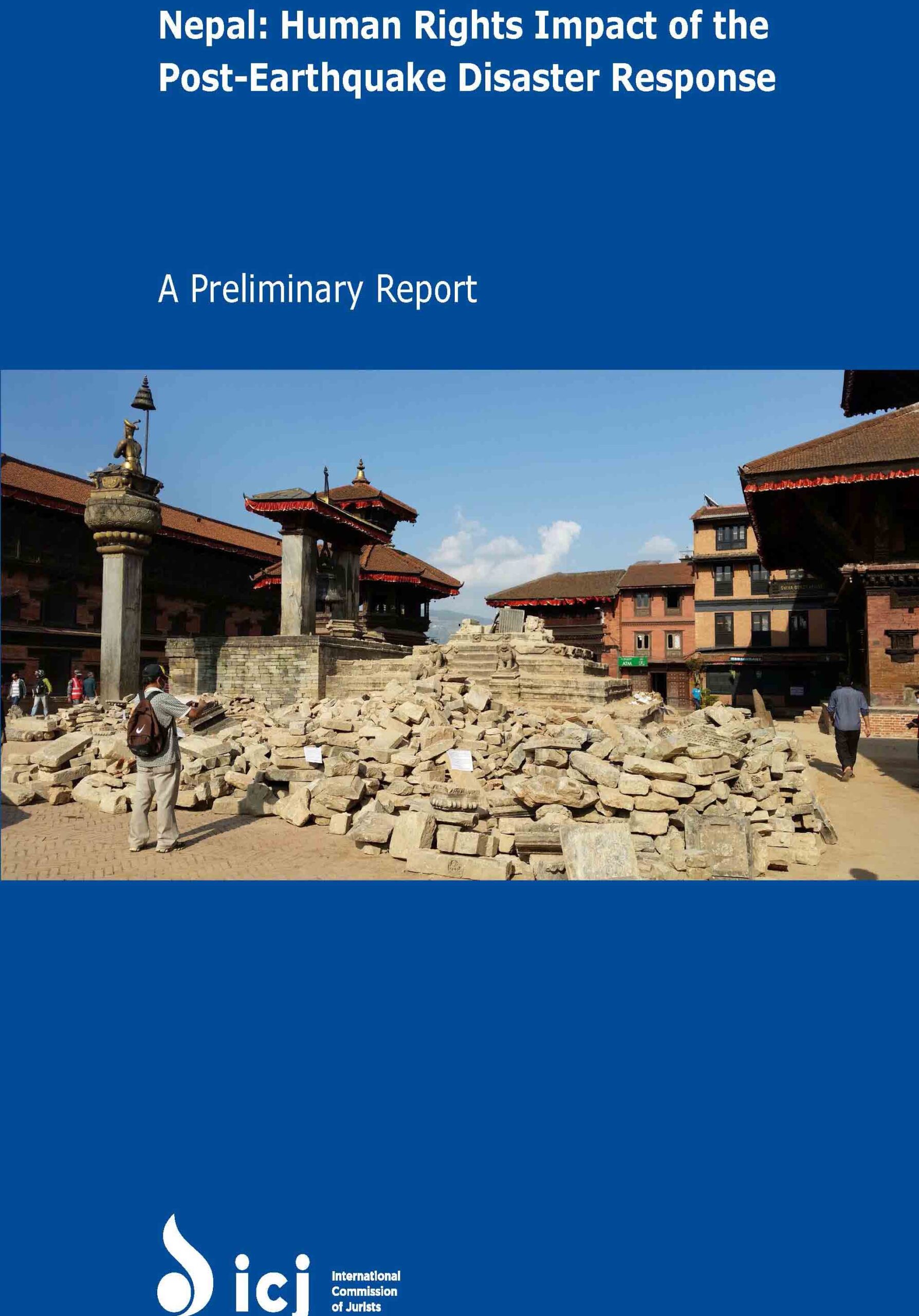As the Government and the National Reconstruction Authority (NRA) finally begin the reconstruction phase of their response to the 2015 earthquake, they must ensure that the post-earthquake recovery moves forward in full accordance with the country’s human rights obligations.
Nepali authorities must ensure that post-earthquake assistance is based on needs alone and without discrimination on any status grounds, including descent (caste), gender, ethnicity or political affiliation, say the ICJ and and the Nepal Bar Association (NBA).
A preliminary report released today presents the results of a fact-finding study conducted in 2015 by the ICJ, in collaboration with the NBA, and focuses on three disaster-affected districts of Gorkha, Dolakha and Okhaldungha with the aim of assessing the humanitarian response in the earthquake’s immediate aftermath on the basis of international human rights law and standards.
In particular, the report notes that such assistance must be directed at protecting key economic and social rights, such as the rights to food, water, adequate housing, health, education and adequate standard of living.
“The ICJ and the NBA found that the political delays in operationalizing the NRA aggravated existing problems with marginalized groups and hampered the provision of necessary aid,” said Nikhil Narayan, the ICJ’s Senior Legal Advisor for South Asia and Head of Office in Nepal.
“Nepali authorities, particularly the newly launched NRA, must re-affirm their commitment to protecting the rights of those affected by the earthquake who have been suffering for nearly one year now,” he added.
The report aims to assist policy makers, particularly the recently operational NRA, and humanitarian actors by identifying the most immediate human rights concerns and providing recommendations to ensure the protection of the human rights of affected populations.
Among its main findings, the report raises concerns that:
- The Nepal Government’s undue delay in formulating a comprehensive long term policy plan for resettlement, livelihood and other assistance for those displaced has severely infringed victims’ right to adequate housing;
- The undue delay for political reasons in the establishment of a central coordinating body such as the NRA, and the failure to provide adequate guidance to local authorities in the meantime, exacerbated the other infringements of rights by stalling the relief and reconstruction process;
- The loss of documentation and the burdensome process to reacquire necessary documentation, including EVIC cards, other personal identity records and land and property ownership records, greatly impacted victims’ access to humanitarian assistance to fulfill at least the minimum essential levels of their economic and social rights and the right to recognition before the law;
- Many of the most vulnerable victims were not provided adequate information by authorities on the assistance to which they were entitled, or the process by which they could access these entitlements;
- The lack of a participatory or transparent consultative process in the design and implementation of relief programs, and a lack of awareness of available complaints mechanisms, denied many victims access to needs-appropriate relief and to redress for their grievances;
- While further in-depth field research is necessary, anecdotal information suggested that discrimination based on political affiliation, caste and gender persisted in some degree in the humanitarian relief process.
Among its key recommendations, the report observes that:
- The Government of Nepal should ensure that the NRA is provided adequate resources to fulfill its mandate promptly, independently, impartially and with full consideration for Nepal’s national and international human rights obligations;
- Nepali authorities (both the Government and the NRA) should ensure that the resettlement and reconstruction process is carried out transparently and uniformly based on need alone, in a participatory and consultative manner, and in conformity with principles of equal protection and non-discrimination;
- Nepali authorities should take special measures where necessary to ensure that women and marginalized and disadvantaged groups have equal access to assistance, including easing the procedural obstacles to obtain assistance due to lost documentation;
- Nepali authorities should ensure that an independent and impartial mechanism is available to promptly, effectively and transparently investigate complaints of discrimination, abuse of authority or corruption in both the prior phase of relief as well as the next phase of reconstruction, and that those persons found responsible are held accountable.
The NRA formally launched its operations on 16 January 2016, and is now preparing to distribute the first installment of housing reconstruction grants for displaced persons in Dolakha in coming weeks.
“Nepali authorities had a monumental challenge to respond urgently to the devastating human and physical toll caused by the April 2015 earthquake, even as they too were suffering the same trauma as the rest of the population,” said Sunil Pokharel, the NBA’s Secretary General.
“At the same time, safeguarding the human rights of victims is especially critical in times of disaster, and the State has a duty to ensure that human rights are fully integrated in post-disaster humanitarian assistance from the outset and at all phases,” he added.
Nepal-Earthquake Disaster response-Publications-Reports-2016-ENG (full report in PDF)

